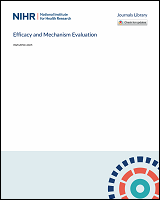NCBI Bookshelf. A service of the National Library of Medicine, National Institutes of Health.
Chappell LC, Bell JL, Smith A, et al. Ursodeoxycholic acid to reduce adverse perinatal outcomes for intrahepatic cholestasis of pregnancy: the PITCHES RCT. Southampton (UK): NIHR Journals Library; 2020 Dec. (Efficacy and Mechanism Evaluation, No. 7.9.)

Ursodeoxycholic acid to reduce adverse perinatal outcomes for intrahepatic cholestasis of pregnancy: the PITCHES RCT.
Show detailsWhy did we do this trial?
Intrahepatic cholestasis of pregnancy is the commonest pregnancy-specific liver disorder in the UK. It affects around 5500 women per year, causing troublesome itching, raised maternal bile acid concentrations, premature birth and, in extreme cases, stillbirth.
The most popular current drug used to treat intrahepatic cholestasis of pregnancy is called ursodeoxycholic acid (commonly known as ‘urso’), but it has not been tested in any large clinical trials to show whether or not it prevents premature birth and stillbirth. Our trial asked: ‘If a woman has intrahepatic cholestasis of pregnancy, what are the effects on the baby if she is treated with ursodeoxycholic acid (or placebo)?’.
What did we do?
Between December 2015 and September 2018, we recruited 605 women with intrahepatic cholestasis of pregnancy. Half of the women received ursodeoxycholic acid and half received a placebo (a ‘dummy’ tablet containing no active ingredients). This is the most reliable way to test a drug.
During the trial we also:
- collected blood test results
- measured the women’s itching level
- recorded birth information
- collected blood samples from some women to use for future research.
What did we find?
We found that ursodeoxycholic acid is not a drug that helps women with intrahepatic cholestasis of pregnancy. It did not reduce stillbirths or the chances of a baby needing to be admitted to a neonatal unit. It did not show any meaningful improvement in itching level for most women, nor did it reduce the woman’s bile acid levels.
What does this mean for women with intrahepatic cholestasis of pregnancy?
It means that most women do not need to take ursodeoxycholic acid because it will not help their itching or protect their baby from stillbirth. Further research is needed to identify whether there is a group of women who may still benefit from taking ursodeoxycholic acid, or whether other drugs could reduce the itching in women with intrahepatic cholestasis of pregnancy and prevent premature delivery and stillbirth.
- Plain English summary - Ursodeoxycholic acid to reduce adverse perinatal outcome...Plain English summary - Ursodeoxycholic acid to reduce adverse perinatal outcomes for intrahepatic cholestasis of pregnancy: the PITCHES RCT
Your browsing activity is empty.
Activity recording is turned off.
See more...